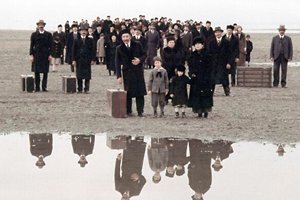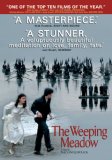| Reviews & Columns |
|
Reviews DVD TV on DVD Blu-ray 4K UHD International DVDs In Theaters Reviews by Studio Video Games Features Collector Series DVDs Easter Egg Database Interviews DVD Talk Radio Feature Articles Columns Anime Talk DVD Savant Horror DVDs The M.O.D. Squad Art House HD Talk Silent DVD
|
DVD Talk Forum |
|
|
| Resources |
|
DVD Price Search Customer Service #'s RCE Info Links |
|
Columns
|
|
|
Weeping Meadow, The

There is hardly another director in the annals of Modern Greek cinema as prolific and well-respected as Athens-native Theo Angelopoulos. Considered one of the last true European visionaries alongside Bernardo Bertolucci and Ingmar Bergman this remarkably gifted director is practically unknown in North America. Angelopoulos' work has been accessible mostly through overused and second-hand VHS relics often either dubbed or severely pan-scanned for the viewing (dis)pleasure of the few brave enough souls willing to seek out his films.
With Trilogia I: To Livadi pou dakryzei a.k.a Trilogy: The Weeping Meadow (2004), the first installment of an ambitious trilogy which is meant to cover the history of contemporary Greece, Theo Angelopoulos sends us back to early 1919 Thessaloniki where hundreds of Greek refugees arrive from Odessa. Amongst those forced away from their homes is Eleni (Alexandra Aidini), a young orphan, who has been traveling together with Spyros (Vassilis Kolovos),his wife Danae (Thalia Argiriou), and son Alexis.
Fast-forward almost twenty years later and Spyros's wife has passed away leaving the old man unsure about his future. Unwilling to spend the rest of his days alone Spyros has arranged to marry the beautiful Eleni. On the day of the wedding, however, Eleni runs away with Spyros' son Alexis (Nikos Poursadinis) leaving the old man behind. Following up a group of street musicians Eleni and Alexis will try to rebuild their lives in a country overshadowed by a newly established Fascist regime and a world on the brink of WW2.
Clocking in at nearly 3 hours this epic story of survival and friendship amidst political hysteria is absolutely staggering. The images of the arriving refugees shrouded in a sea of heavy fog have to be seen to be believed. Trilogy:The Weeping Meadow is indeed a difficult film to decipher whose visual beauty could be quite deceiving as the heavy symbolism which Theo Angelopoulos is known for certainly plays a major role in this film. The story is often fractured into little pieces which do not necessarily line up together forming a homogenous plot. Indeed, everything in Trilogy: The Weeping Meadow takes time to evolve requiring the viewer to be as focused as possible.
What truly separates Theo Angelopoulos and his film from just about everything else you have seen is the enormous visual power of his camera. The breathtaking vistas that Trilogy: The Weeping Meadow contains mixed with a sense of nostalgia which the always rainy Greek islands evoke are probably best comparable to a Tarkovsky film. There is something so mesmerizing in watching Angelopoulos build up his story...slowly, almost as if he wanted the film to be an intimate experiment, the Greek master wraps you in a sea of symbolism where attention to detail is paramount.
Do not expect everything in Trilogy: The Weeping Meadow to be meticulously explained and consequently justified. There are many scenes that remain confrontational to what "common logic" might suggest. In a fashion similar to the one his ancient ancestors were known for Theo Angelopoulos' film relies on myth as much as it relies on reality. As a result you will notice that quite often Trilogy: The Weeping Meadow takes in a direction that is rather unexpected.
In addition to a spellbinding visual composition Trilogy: The Weeping Meadow also offers a hypnotic soundtrack which is in my opinion the core foundation for this film. The use of bouzouki, santouri, clarinet, and accordion creates an environment which you are unlikely to find in conventional European cinema. The ethnic feel of Mediterranean Greece which Trilogy: The Weeping Meadow recreates is astounding.

Such thematically complicated yet utterly rewarding productions as Theo Angelopoulos' Trilogy: The Weeping Meadow are certainly quite uncommon nowadays. The visual style, the manner in which the story is structured, the often misleading symbolism, which Angelopoulos' film reveals are all aspects that other contemporary directors typically shy away from. Indeed, when style and substance are mixed to perfection as it is the case with Trilogy: The Weeping Meadow the results are impressive.
Awards/ Recognition:
In 2004 Trilogy: The Weeping Meadow was nominated for Golden Bear at the Berlin International Film Festival. During the same year the film was the winner of the FIPRESCI Award for Best Director (Theo Angelopoulos) granted by the European Film Academy.
How Does the DVD Look?
Presented in its original aspect ratio of 1.78:1 and enhanced for widescreen TV's The Weeping Meadow arrives to R1 land with a botched transfer!! New Yoker have treated Aneglopoulos' film the way I expected them to: by providing an unconverted PAL-NTSC transfer. The result as you could easily guess is a far cry from the R2 Greek disc we reviewed at DVDTALK. My guess is that what New Yorker have gotten a hold of is the UK Artificial Eye release hence the near identical color-schemes the two transfers reveal. Needless to say there is plenty of "ghosting" here and detail is not as good as you would want it to be. Nevertheless, if you are not yet region free this might well be your one and only option of seeing the film on a legit R1 disc.
How Does the DVD Sound?
Not bad at all!! What we get here is the standard Greek 2.0 and 5.1 tracks (found on the Greek and Aussie/UK discs) with optional English subtitles. I was not able to detect anything that might trouble your viewing of this film: the audio treatment is good!
Extras:
While the R2 Greek disc did not offer any extras at all New Yorker have ported a rare well known interview with Angelopoulos which could be found on the UK disc (which actually borrows it from an earlier released French disc). This is a massive nearly 30-minute piece that provides an invaluable look at the creative process the Greek director favors and for English-speakers this is indeed a tremendous opportunity to learn more about one of the great filmmakers from the last century. Finally, you will also find a theatrical trailer for the film alongside a nicely done booklet.
Final Words:
If you are region-free your money should not be going New Yorker's way as they have provided yet another botched transfer! You should be seeking the Greek disc (or if budget does not allow at least the Aussie or UK replicas). If you are however "locked" in R1 land then I suggest a quick trip to your local video store!
|
| Popular Reviews |
| Sponsored Links |
|
|
| Sponsored Links |
|
|
| Release List | Reviews | Shop | Newsletter | Forum | DVD Giveaways | Blu-Ray | Advertise |
|
Copyright 2024 DVDTalk.com All Rights Reserved. Legal Info, Privacy Policy, Terms of Use,
Manage Preferences,
Your Privacy Choices | |||||||












